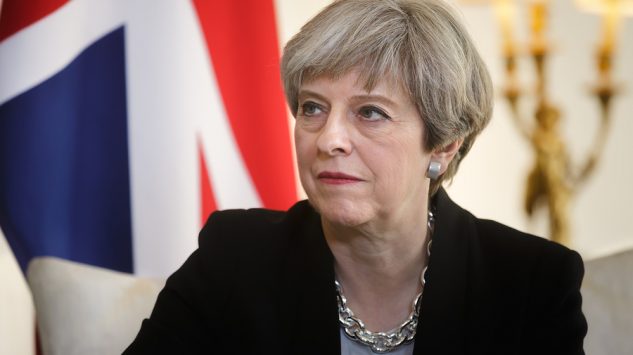Issue Briefs

UK PM May facing leadership challenge
Graham Bardgett
December 12, 2018
UK Prime Minister Theresa May faced a vote of confidence in her leadership on December 12, as her own Conservative Party decides her future.
As Mrs May pleaded for help on Tuesday visiting European leaders in Berlin and Brussels her own Party was actually plotting against her.
In Westminster a Secret Ballot was triggered by Tory MP letters to the 1922 Committee, the body in charge of Conservative Party leadership issues. But early on December 12 she emerged from Number 10 Downing Street to say “I will contest that vote with everything I have got.”
Defiant May
As the UK teeters on a precipice over her failed EU Brexit Treaty attempts she said a new prime minister would have to scrap or extend Article 50, the mechanism taking Britain out of the EU on 29 March — or “delay or even stopping Brexit” altogether.
Mrs May said changing Conservative leader would “put our country’s future at risk and create uncertainty when we can least afford it”. “A leadership election would not change the fundamentals of the negotiation or the Parliamentary arithmetic”.
“Weeks spent tearing ourselves apart will only create more division, just as we should be standing together to serve our country. None of that would be in the national interest,” she said.
She claimed she was making progress in her talks with EU leaders and vowed to “deliver on the referendum vote of 2016 and seize the opportunities that lie ahead”. But her comments were in stark contrast to what she was told in Europe – that there could be no further negotiation on the Deal.
Mrs May said the Conservatives had to build a “country that works for everyone” and deliver “the Brexit people voted for”. “I have devoted myself unsparingly to these tasks ever since I became prime minister and I stand ready to finish the job.”
Tory Party challenge
The challenge to Mrs May’s position comes after the required 48 letters calling for a contest were delivered. Mrs May, who has been prime minister since shortly after the UK voted to leave the European Union in 2016, has faced criticism in her party for the Brexit plan she has negotiated.
Sir Graham Brady, chairman of backbench Tories, who is overseeing the vote, said: “We are looking at the leadership of the party and clearly the prime minister remains until there is a successor.” Sir Graham said he had told the prime minister on Tuesday evening that she would face a confidence vote. She had been “businesslike” and “was very keen that matters be resolved as quickly as was reasonably possible”, added Sir Graham.
Difficult talks with the EU
Mrs May has been meeting European leaders and EU officials. Her first engagement was with Dutch Prime Minister Mark Rutte. She then met with Germany’s Angela Merkel. Mrs May said she needs “further assurances” about the Northern Ireland border to get the Treaty ratified by Westminster MPs. But Labour Opposition leader Jeremy Corbyn said she had “lost control of events” and called for her to stand down, saying she had lost all credibility.
On December 1, while Mrs May was in Berlin, even her car door would not open – taking the intervention several times of her Close Protection bodyguard – as German Prime Minister Angela Merkel watched the embarrassing scene.
Back in London, in announcing her U-Turn on Monday cancelling the ratification vote Mrs May was laughed at by MPs when she told them she had listened to their views on the deal which she had previously claimed had broad agreement.
EU: No additional Brexit negotiations
In Brussels European Commission President Jean-Claude Juncker was applauded when he said the EU would not “renegotiate”. However he did say the deal had room for “further clarifications”. Jean-Claude Juncker, who usually speaks for all 27 EU leaders, later held talks with Mrs May. But he insisted: “The deal that we have achieved is the best deal possible; it is the only deal possible.”
The Irish border problem
The crunch issue is the border with the Republic of Ireland which –it is claimed– threatens the sovereignty of the United Kingdom of Great Britain and Northern Ireland. The present EU deal sets Northern Ireland apart and a so-called Back-Stop arrangement draws a line down the Irish Sea. There are claims that the Good Friday Agreement that brought peace after decades of terrorism could be thrown out of the window. Belfast is only 100 miles from Dublin and the journey –assuming no border– takes less than two hours.
Conservative Brexiteers and the Northern Ireland Democratic Unionist Party, whose votes Mrs May relies on to win key decisions in the Commons, have called for the entire backstop plan to be dropped.
 |
Graham Bardgett is a Global Policy Institute Fellow. He has reported for the Los Angeles Post Examiner and Baltimore Post Examiner and is a former BBC Radio News sub-editor in London and Veteran reporter of the Northern Ireland Troubles and Peace Process. He had five years on the news desk of BBC Northern Ireland, nine years as a security reporter on the Belfast Telegraph, four years as Ireland staff reporter for the Daily Mail, and was a correspondent for the Financial Times, Daily Mirror, Sunday Express, and Irish Daily Mail. During his career he has also reported from Berlin, Luxembourg, and Rome, and carried out public affairs critical incident consultancy work in Kazakhstan and in London. He had four years with PwC international accountants and consultants; and was previously a UK Government Higher Executive Press Officer. |
The views and opinions expressed in this issue brief are those of the author.